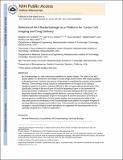| dc.contributor.author | Ghosh, Debadyuti | |
| dc.contributor.author | Kohli, Aditya G. | |
| dc.contributor.author | Moser, Felix | |
| dc.contributor.author | Endy, Drew | |
| dc.contributor.author | Belcher, Angela M | |
| dc.date.accessioned | 2014-11-19T19:45:52Z | |
| dc.date.available | 2014-11-19T19:45:52Z | |
| dc.date.issued | 2012-12 | |
| dc.date.submitted | 2012-06 | |
| dc.identifier.issn | 2161-5063 | |
| dc.identifier.issn | 2161-5063 | |
| dc.identifier.uri | http://hdl.handle.net/1721.1/91614 | |
| dc.description.abstract | M13 bacteriophage is a well-characterized platform for peptide display. The utility of the M13 display platform is derived from the ability to encode phage protein fusions with display peptides at the genomic level. However, the genome of the phage is complicated by overlaps of key genetic elements. These overlaps directly couple the coding sequence of one gene to the coding or regulatory sequence of another, making it difficult to alter one gene without disrupting the other. Specifically, overlap of the end of gene VII and the beginning of gene IX has prevented the functional genomic modification of the N-terminus of p9. By redesigning the M13 genome to physically separate these overlapping genetic elements, a process known as “refactoring,” we enabled independent manipulation of gene VII and gene IX and the construction of the first N-terminal genomic modification of p9 for peptide display. We demonstrate the utility of this refactored genome by developing an M13 bacteriophage-based platform for targeted imaging of and drug delivery to prostate cancer cells in vitro. This successful use of refactoring principles to re-engineer a natural biological system strengthens the suggestion that natural genomes can be rationally designed for a number of applications. | en_US |
| dc.description.sponsorship | National Cancer Institute (U.S.) (Centers for Cancer Nanotechnology Excellence (U54-CA119349-04)) | en_US |
| dc.description.sponsorship | National Science Foundation (U.S.) (Synthetic Biology Engineering Research Center (SynBERC)) | en_US |
| dc.language.iso | en_US | |
| dc.publisher | American Chemical Society (ACS) | en_US |
| dc.relation.isversionof | http://dx.doi.org/10.1021/sb300052u | en_US |
| dc.rights | Article is made available in accordance with the publisher's policy and may be subject to US copyright law. Please refer to the publisher's site for terms of use. | en_US |
| dc.source | PMC | en_US |
| dc.title | Refactored M13 Bacteriophage as a Platform for Tumor Cell Imaging and Drug Delivery | en_US |
| dc.type | Article | en_US |
| dc.identifier.citation | Ghosh, Debadyuti, Aditya G. Kohli, Felix Moser, Drew Endy, and Angela M. Belcher. “Refactored M13 Bacteriophage as a Platform for Tumor Cell Imaging and Drug Delivery.” ACS Synthetic Biology 1, no. 12 (December 21, 2012): 576–582. | en_US |
| dc.contributor.department | Massachusetts Institute of Technology. Department of Biological Engineering | en_US |
| dc.contributor.department | Koch Institute for Integrative Cancer Research at MIT | en_US |
| dc.contributor.mitauthor | Belcher, Angela M. | en_US |
| dc.contributor.mitauthor | Ghosh, Debadyuti | en_US |
| dc.contributor.mitauthor | Kohli, Aditya G. | en_US |
| dc.contributor.mitauthor | Moser, Felix | en_US |
| dc.relation.journal | ACS Synthetic Biology | en_US |
| dc.eprint.version | Author's final manuscript | en_US |
| dc.type.uri | http://purl.org/eprint/type/JournalArticle | en_US |
| eprint.status | http://purl.org/eprint/status/PeerReviewed | en_US |
| dspace.orderedauthors | . | en_US |
| dc.identifier.orcid | https://orcid.org/0000-0001-9353-7453 | |
| dc.identifier.orcid | https://orcid.org/0000-0002-7762-3084 | |
| mit.license | PUBLISHER_POLICY | en_US |
| mit.metadata.status | Complete | |
